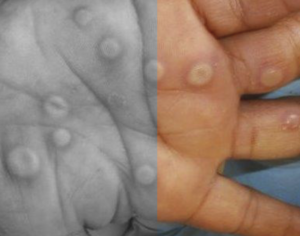New reports on MPX vaccine efficacy suggest protection but cases reported after two shots
3 October 2022. Related: mpox.
 As noted in the monkeypox (MPX) special report earlier in this issue of HTB, several analyses have reported fewer cases of MPX in people who have received a single shot of the MPX vaccine. [1]
As noted in the monkeypox (MPX) special report earlier in this issue of HTB, several analyses have reported fewer cases of MPX in people who have received a single shot of the MPX vaccine. [1]
However, although these results are tentatively optimistic, they are based on retrospective observational data in a population in which significant behavioural differences would be expected in the vaccinated group.
Many of those vaccinated could have been actively health-seeking and who were initially at very low risk. These people might also be avoiding risk now while waiting, for example, for a second shot.
These results include an MMWR study of 5,402 cases in men aged 18 to 49 years old where MPX was 14-fold more likely in those who were unvaccinated. Among these cases, 4,606 (85%) were unvaccinated, 269 (5%) occurred ≤13 days after a first shot, 77 (1.4%) ≥14 days after the first shot, and 450 (8.3%) had an unknown vaccination date. Of note, 14 cases were reported after a second shot (10 within 13 days and 2 more than 14 days after). [2]
A second US study, published as a research letter in JAMA, reported 90 MPX cases from a cohort of 7339 people who had received at least one MPX vaccine. Of these, 37 were diagnosed within the first week, 32 within the second and 13 during the third and fourth weeks post vaccination. However, 8 people were diagnosed more than four weeks after the first shot, including 2 cases more than three weeks after the second shot. [3]
These data support earlier i-Base reports to allow up to four weeks before relying on optimum vaccine protection and that infections are still possible two weeks after a second shot.
A small Israeli study, not yet peer reviewed, reported a similar protective impact of vaccination, but only involved 18 cases: 3/873 vaccinated (>25 days after a single shot) and 15/1097 unvaccinated (40 vs 6.4 cases per 100,000 person-days). However, in addition to not being able to adjust for MPX risk, there were significant differences in baseline demographics between the two groups. [4]
The time to diagnosis in the three cases in the vaccination group was also interesting. Although the paper reports this as being more than two weeks after vaccination, the authors don’t allow for the incubation period. Also, the incidence of MPX in Israel didn’t show any overall declines in the period after the vaccines.
More cautious results from a study that measured antibody responses after MPX vaccination, also published as a pre-print before peer review, suggested that third doses might be needed. [5]
comment
Results are cautiously optimistic – certainly better than if they were the other way round.
Observational data will be all we have for a while, so this is useful. If patterns of vaccine uptake were similar to London, for example, these results could easily just be a marker for health-seeking behaviour from men who are at lower overall risk.
This is especially in studies where there were very few infections overall.
References
- Monkeypox into Autumn: still no emergency funding, vaccine efficacy and UK declines further vaccines. HTB (3 October 2022).
i-base.info/htb/44255 - Payne AB et al. Incidence of monkeypox among unvaccinated persons compared with persons receiving ≥1 JYNNEOS vaccine dose — 32 USjurisdictions, July 31–September 3, 2022. MMWR Morb Mortal Wkly Rep 2022;71:1278–1282. DOI: 10.15585/mmwr.mm7140e3.
www.cdc.gov/mmwr/volumes/71/wr/mm7140e3.htm - Hazra A et al. Human monkeypox virus infection in the immediate period after receiving modified vaccinia ankara vaccine. JAMA. doi:10.1001/jama.2022.18320. (30 September 2022).
jamanetwork.com/journals/jama/fullarticle/2797135 - Arbel R et al. Effectiveness of a single-dose modified vaccinia ankara in human monkeypox: an observational study. Pre-print, not yet peer reviewed. DOI: 10.21203/rs.3.rs-1976861/v2.
www.researchsquare.com/article/rs-1976861/v2 - Zaeck LM et al. Low levels of monkeypox virus neutralizing antibodies after MVA-BN vaccination in healthy individuals. medRxiv; 2022. DOI: 10.1101/2022.08.31.22279414.
www.medrxiv.org/content/10.1101/2022.08.31.22279414v1

